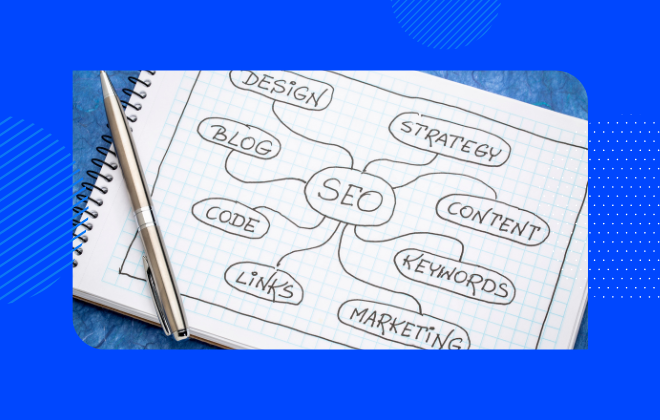In this article, we’ll cover the best practices for improving your website’s search rankings, including on-page optimization, off-page optimization, and other tactics to help your website rank higher on SERPs.
Keyword Research
One of the most fundamental aspects of SEO is keyword research. This involves identifying the keywords and phrases that your target audience is searching for and then optimizing your website’s content around those keywords. The goal is to rank for keywords that are relevant to your business and have a high search volume.
Tools such as Google Keyword Planner and SEMrush can help you identify the best keywords for your website. Once you have a list of keywords, make sure to incorporate them into your website’s content, meta tags, and other on-page elements.
On-Page Optimization for Search Rankings
On-page optimization refers to the practice of optimizing individual web pages to improve their search engine visibility. This includes optimizing your website’s content, meta tags, headings, and images.
Content Optimization
Content is king when it comes to SEO. Your website’s content should be high-quality, informative, and engaging. Make sure to incorporate your target keywords into your content, but don’t overdo it – keyword stuffing can hurt your rankings.
Meta Tags
Meta tags provide information about your web page to search engines. The most important meta tags for SEO are the title tag and meta description. The title tag should include your target keyword and provide a concise, accurate description of your web page. The meta description should also include your target keyword and provide a brief summary of your web page’s content.
Headings
Headings help organize your content and make it easier for users to read. Use H1 tags for your main page heading and H2 tags for subheadings. Incorporate your target keywords into your headings where appropriate.
Images
Images can make your website more visually appealing, but they can also slow down your website’s load time if they’re not optimized properly. Make sure to compress your images and use descriptive file names and alt tags that include your target keywords.
Off-Page Optimization for Search Rankings
Off-page optimization refers to the practice of optimizing external factors that influence your website’s search engine visibility. The most important off-page factor is backlinks – links from other websites that point to your website.
Link Building
Link building is the process of acquiring links from other websites to your own website. These links are also known as “backlinks” or “inbound links”. Link building is an important component of off-page optimization, as search engines consider the quantity, quality, and relevance of the links pointing to your website when determining its authority and ranking on search engine results pages (SERPs).
There are several types of backlinks, including:
- Natural backlinks: These are links that are earned naturally when other websites find your content useful and link to it without any solicitation.
- Manual backlinks: These are links that are acquired through intentional outreach and link-building activities. This includes guest posting, broken link building, and resource link building.
- Self-created backlinks: These are links that are created by yourself, such as adding links to your website in forum signatures, blog comments, or social media profiles.
When it comes to link building, it’s important to focus on quality over quantity. A few high-quality, relevant backlinks from authoritative websites in your industry are more valuable than a large number of low-quality, irrelevant backlinks.
Here are some tips for effective link-building:
- Create high-quality, useful content that other websites will want to link to.
- Conduct outreach to relevant websites and bloggers in your industry to ask for backlinks.
- Use social media to promote your content and build relationships with other bloggers and website owners.
- Participate in industry forums and online communities, and add value to discussions by linking to relevant content on your website.
- Monitor your backlink profile regularly using tools like Ahrefs or Moz, and disavow any low-quality or spammy links that may be harming your website’s ranking.
Remember, link-building is an ongoing process that requires time, effort, and dedication. By consistently building high-quality backlinks, you can improve your website’s authority and ranking on SERPs, ultimately driving more traffic and leads to your site.
Social Media Marketing
Social media can be a powerful tool for driving traffic to your website and acquiring backlinks. Share your website’s content on social media and engage with your followers to build relationships that can lead to backlinks.
Local SEO and Search Rankings
If your business has a physical location, local SEO is important for improving your website’s visibility in local search results. Make sure to include your business’s name, address, and phone number (NAP) on your website and in local directories such as Google My Business.
Mobile Optimization and Search Rankings
Mobile optimization is critical for improving your website’s search engine visibility. With more people using mobile devices to browse the web, search engines are placing more emphasis on mobile-friendly websites. Make sure your website is responsive and loads quickly on mobile devices.
User Experience and Search Rankings
User experience (UX) is another important factor in determining your website’s search engine rankings. A website that is easy to navigate and provides a positive user experience is more likely to keep users on the site and encourage them to engage with your content. This can lead to higher rankings and more traffic. Make sure your website is easy to navigate, loads quickly and provides valuable content to your users.
Search Engine Marketing
Search Engine Marketing (SEM) is a type of digital marketing that involves promoting websites by increasing their visibility in search engine results pages (SERPs) through paid advertising and optimization. SEM typically involves two main components: Pay-Per-Click (PPC) advertising and Search Engine Optimization (SEO).
- PPC advertising: Also known as paid search advertising, involves paying search engines like Google, Bing, or Yahoo to display your website or landing page at the top of the search results when users search for specific keywords or phrases. These ads are usually marked as “sponsored” or “ad” and are displayed above the organic search results. Advertisers only pay when users click on their ads, which makes this a cost-effective form of advertising.
- SEO: It involves optimizing your website to improve its visibility and ranking in organic search results. This involves a number of techniques such as keyword research, on-page optimization, link building, content creation, and technical optimization. SEO can help your website rank higher in search results and drive more traffic to your site.
SEM is a highly effective way to increase visibility and traffic to your website. By using a combination of PPC advertising and SEO, businesses can ensure that their website is highly visible to potential customers who are actively searching for their products or services. However, SEM can be complex and time-consuming, and it requires a good understanding of search engine algorithms, keyword research, and other technical skills. Therefore, many businesses choose to hire a digital marketing agency, like Datawyze, or specialist to manage their SEM campaigns.
Search Engine Algorithms
Search engine algorithms are constantly changing, and it’s important to stay up-to-date on the latest trends and best practices for SEO. Make sure to stay informed about algorithm updates and adjust your SEO strategy accordingly.
Search Engine Optimization Strategy
Search engine optimization (SEO) is the process of optimizing a website or a webpage to rank higher in search engine results pages (SERPs) for specific keywords or phrases. A successful SEO strategy involves a combination of different tactics and techniques, which can be divided into two main categories: on-page optimization and off-page optimization.
On-page optimization
This refers to the process of optimizing individual web pages in order to improve their search engine rankings and earn more relevant traffic. This includes optimizing the content on the page, the title tags, meta descriptions, header tags, images, and other elements that contribute to the overall user experience. Some of the key elements of on-page optimization include keyword research and analysis, creating high-quality, unique content, optimizing title tags and meta descriptions, and using header tags to structure content.
Off-page optimization
On the other hand, this refers to the process of optimizing factors outside of your website that influences your search engine rankings. This includes building high-quality backlinks, improving social media presence, creating engaging content that encourages shares and engagement, and optimizing for local search. Building backlinks from reputable websites is one of the most important off-page optimization tactics, as search engines use links as a signal of the quality and authority of a website.
Other important elements of an effective SEO strategy include: keyword research and analysis, competitor analysis, technical SEO, mobile optimization, and local SEO. Keyword research and analysis are critical to identifying the most relevant keywords and phrases to target, while competitor analysis can provide valuable insights into what your competitors are doing well and where there may be opportunities for improvement. Technical SEO involves optimizing elements like site speed, mobile responsiveness, and URL structure, while local SEO is important for businesses that serve specific geographic areas.
Overall, a successful SEO strategy requires a combination of on-page and off-page optimization tactics, a deep understanding of your target audience and their search behaviour, and a commitment to ongoing monitoring and optimization. By following best practices and staying up-to-date with the latest trends and developments in search engine algorithms, you can help ensure that your website is visible and relevant to your target audience, driving more traffic, leads, and conversions over time.
Conclusion
Improving your website’s search engine visibility is crucial for online success. By incorporating the best practices for SEO, including on-page optimization, off-page optimization, and other tactics, you can improve your website’s search rankings and drive more traffic to your site. Remember, SEO is not a one-time task, but an ongoing process that requires constant monitoring and adjustment. Keep track of your website’s performance using tools like Google Analytics, and make adjustments to your SEO strategy as needed.
By following the best practices for SEO, you can improve your website’s visibility and drive more traffic to your site. Start by researching your target audience and identifying the keywords they’re searching for, then optimize your website’s content, meta tags, and other on-page elements. Acquire high-quality backlinks from reputable websites, engage with your followers on social media, and optimize your website for mobile devices and user experience.
Ultimately, the key to success with SEO is developing a comprehensive strategy that takes into account all of the different factors that influence your website’s search engine visibility. By working with a trusted agency like Datawyze, you can get the help you need to develop and implement an effective SEO strategy that can help your business succeed online.
So, if you’re looking to improve your website’s search engine visibility and drive more traffic to your site, consider implementing these best practices for SEO and reaching out to Datawyze for expert guidance and support. With the right strategy and tactics, you can improve your search rankings, boost your online visibility, and achieve greater success in today’s competitive digital landscape.





